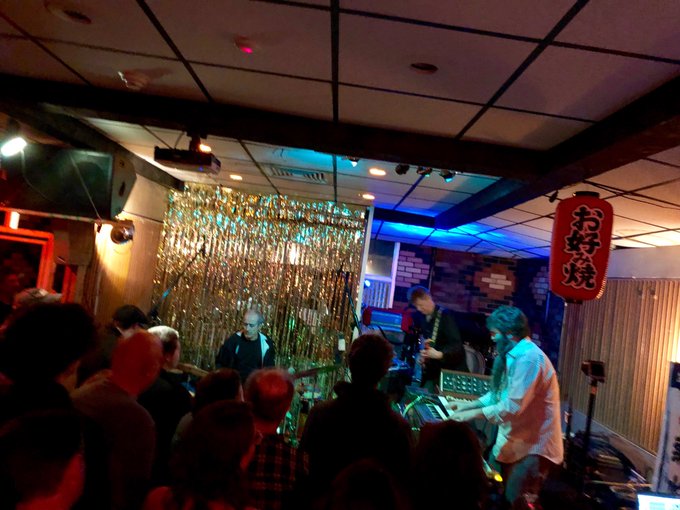Extraordinary times call for extraordinary music.
Shabaka & The Ancestors, “The Coming of the Strange Ones”
It’s hard to imagine a musical dispatch more in tune with its cultural moment than We Are Sent Here by History, the latest from Shabaka & The Ancestors. Just out on Impulse! Records, it’s an album of stark admonitions and unruly energies, anchored by the pull of an ecstatic communion.
Shabaka Hutchings, the group’s indefatigable leader, plays tenor saxophone and clarinet with smoldering intensity, often in a closely braided harmony with alto saxophonist Mthunzi Mvubu. The rest of the group hails, like Mvubu, from the vibrant South African jazz community. As on their auspicious first album — Wisdom of Elders, released on Brownswood Recordings in 2016 — these players marshal a range of ideas, some rooted in folkloric tradition and others evoking a form of Afrofuturism.
On “The Coming of the Strange Ones,” note how Ariel Zamonsky’s roiling bass vamp sets up a tandem alto-tenor melody, with a fervent churn of percussion pushing everything to the front edge of the beat. (The group’s excellent drummer is Tumi Mogorosi; its percussionist is Gontse Makhene.) Mvubu solos first, in a post-boppish vein; Hutchings starts in a meditative mode, and works up to a fever pitch.
Hutchings has often framed his work as a comment on modern societal collapse. “It is a reflection from the ruins, from the burning,” he says of this album. “A questioning of the steps to be taken in preparation for our transition individually and societally if the end is to be seen as anything but a tragic defeat.”
Tineke Postma, “Parallax”
The incisive alto and soprano saxophonist Tineke Postma hails from The Netherlands, but she has built a strong international profile; her most recent release was a joint effort with Greg Osby. Now on a fine, ambitious new album, Freya, she enlists some of the top talent in the New York area: trumpeter Ralph Alessi, pianist Kris Davis, bassist Matt Brewer and drummer Dan Weiss.
The album opens with “Parallax,” which premieres here. A statement of purpose aligned with state-of-the-art post-bop ideals, it gives everyone in the band the role of a catalyst. Listen for how the rhythm section changes its flow throughout Alessi’s intrepid solo, which leads into a thoughtful alto essay by Postma. There’s endless detail in this music, but its overall impression is as fluid and indivisible as an onrushing wave.
Rufus Reid with Sullivan Fortner, “Always in the Moment”
Rufus Reid is a bassist of deep and unforced authority, with a track record that stretches back some 50 years. Pianist Sullivan Fortner hasn’t been around that long, though at 33 he already has the touch and temperament of a burgeoning master. Put these two musicians together, and you get instant chemistry and camaraderie — along with a gem of an album, Always in the Moment, which recently kicked off the fifth season of Newvelle Records’ vinyl subscription service.
The only way to hear the album in full is on a turntable, in other words, as part of a series. But Newvelle has posted studio footage of “Always in the Moment,” the title track, and it captures the sensitivity and sonority of the duo’s rapport.
Irreversible Entanglements, “No Más”
I referred earlier to the Afrofuturist thrust of Shabaka & The Ancestors, a band largely made up of musicians from Johannesburg. But that same spirit rattles in the music of Irreversible Entanglements, whose members hail from the Northeast Corridor. The band’s new album, Who Sent You? — due out Friday on International Anthem / Don Giovanni — bristles with urgent tensions, and with the poetical invective of Camae Ayewa, the poet known as Moor Mother.
“No Más” was composed by the band’s trumpeter, Aquiles Navarro, who phrases its opening call in an echoing tandem with Keir Neuringer’s tenor saxophone. The video for the song, directed by Imani Nikyah Dennison, was shot in Johannesburg with an Afrofuturist liberation narrative in mind. “We are not disconnected reflections / Of a source / Of a life source,” says Moor Mother, before coming around to statement of righteous refusal.
Bobby Previte, Jamie Saft, Nels Cline, “Woke”
One year ago, I had the pleasure of catching an experimental jazz-rock supertrio at my local ramen joint, a bar called Quinn’s. That confab — drummer Bobby Previte, keyboardist Jamie Saft and guitarist Nels Cline — happened to be recording the show. So a small piece of what I heard that night appears as the penultimate track on their smashing new album, Music From the Early 21st Century.
“Woke,” the track in question, occupies an ambient plane of the sort that you might associate with Rhys Chatham. In the context of the album, it forms a placid bridge — between the synth-metallic tone poem “Machine Learning” and the fuzz-heavy stomp “Flashmob.”
At every turn, Cline, Saft and Previte are composing and executing in real time, with results that feel almost stubbornly hardy in their cohesion. Watching them at Quinn’s, I was struck by a sense memory from about 20 years ago:
The present moment, for many of us, involves an unusual degree of stay-at-home time; it hasn’t been all that long since “social distancing” entered our lexicon, but it already has the ominous ring of a new reality. There will in fact be a new normal, and it will find us back at places like Quinn’s. In the meantime, we thankfully have documentation like this.









More Stories
If he were a guitarist he’d be as well-known as Eric Clapton, but Terry Hanck is a sax player! Videos, Photo
Eric Gales՛s new album 2025, releases single with Buddy Guy & Roosevelt Collier: Video, CD cover
I usually practice with the door open. I always played like that, hoping someone would walk by and discover me: Ahmad Jamal once confessed: Video, Photos